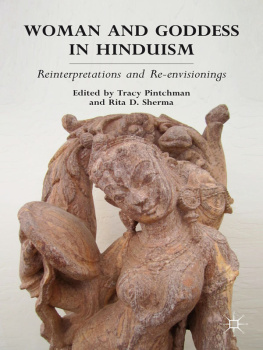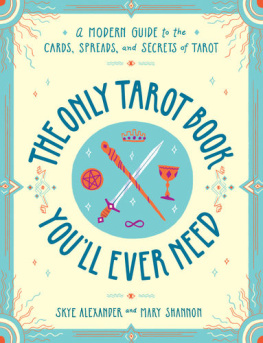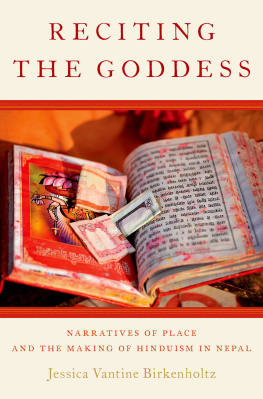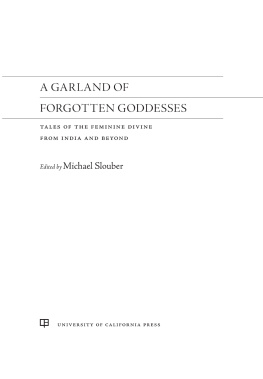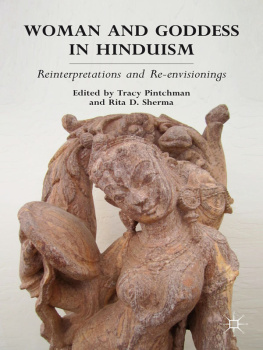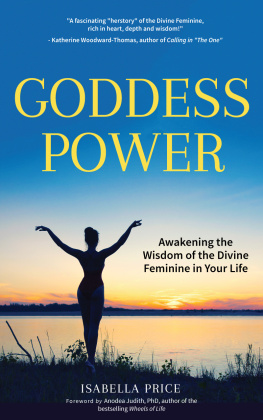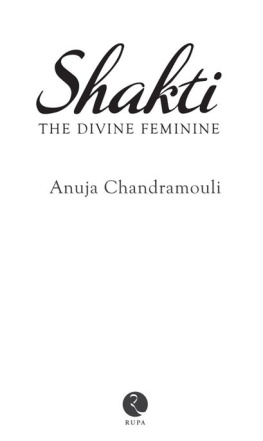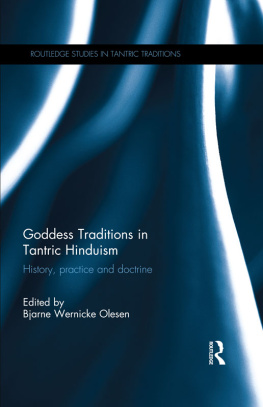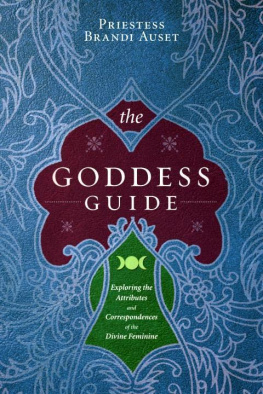W OMAN AND G ODDESS IN H INDUISM
W OMAN AND G ODDESS IN H INDUISM
Reinterpretations and Re-envisionings
Edited by
Tracy Pintchman and Rita D. Sherma


WOMAN AND GODDESS IN HINDUISM
Copyright Tracy Pintchman and Rita D. Sherma, 2011.
All rights reserved.
First published in 2011 by
PALGRAVE MACMILLAN
in the United Statesa division of St. Martins Press LLC,
175 Fifth Avenue, New York, NY 10010.
Where this book is distributed in the UK, Europe and the rest of the world, this is by Palgrave Macmillan, a division of Macmillan Publishers Limited, registered in England, company number 785998, of Houndmills, Basingstoke, Hampshire RG21 6XS.
Palgrave Macmillan is the global academic imprint of the above companies and has companies and representatives throughout the world.
Palgrave and Macmillan are registered trademarks in the United States, the United Kingdom, Europe and other countries.
ISBN: 9780230113695
Library of Congress Cataloging-in-Publication Data
Pintchman, Tracy.
Woman and goddess in Hinduism : reinterpretations and re-envisionings/Tracy Pintchman, Rita D. Sherma.
p. cm.
ISBN-13: 9780230113695 (hardback)
ISBN-10: 0230113699
1. Women in Hinduism. 2. Hindu goddesses. 3. WomenReligious aspectsHinduism. 4. HinduismDoctrines. I. Sherma, Rita DasGupta. II. Title.
BL1237.46.P56 2011
294.52114dc22
2011005468
A catalogue record of the book is available from the British Library.
Design by Newgen Imaging Systems (P) Ltd., Chennai, India.
First edition: August 2011
10 9 8 7 6 5 4 3 2 1
Printed in the United States of America.
For the pioneering women scholars on whose shoulders we stand: Julia Leslie, Barbara Holdrege, Rita Gross, Sanjukta Gupta, and many others
C ONTENTS
Rita D. Sherma
Arvind Sharma
Francis Xavier Clooney
Neela Bhattacharya Saxena
Phyllis K. Herman
Karen Pechilis
Loriliai Biernacki
Laurie L. Patton
E. H. Rick Jarow
Veena Rani Howard
Tracy Pintchman
Acknowledgments
We wish to express our gratitude to our editor Burke Gerstenschlager at Palgrave Macmillan, who recognized the need for this volume and its message, and to Kaylan Connally, editorial assistant, for all her help through the publishing process. Deep appreciation goes to our esteemed contributors for their patience and diligence in working with us, and for the insights and quality reflected in their work. A special note of thanks to Ritas daughter Nisha Sherma, who is responsible for the idea and photography of the art on the front cover. We are indebted to Rohini Krishnan, who oversaw the book production process, and Elspeth Tupelo, who prepared a draft of the index. Finally, we are very grateful to our families and especially our husbands, Dr. Arun Sherma and William French, for their unwavering support.
Introduction:
A Hermeneutics of Intersubjectivity
Rita D. Sherma
In recent years, the growing interest in the relationship between religion and the Feminine, whether human or divine, has given rise to diverse academic volumes exploring this connection in different traditions. The academic examination of the Feminine in Hindu traditions has been, for the most part, rooted in efforts to describe and interpret, using various scholarly methods, including ethnographic, historical, or literary research on Hindu women and Hindu goddess traditions. Important as these areas of study are, they are necessarily circumscribed by the methods of inquiry they employ and hence are, generally speaking, not concerned with exploring the relevance of Hindu understandings of the Feminine to theological concerns or contemporary forms of gender activism.
The aim of this book is to offer a multilayered exploration of Hindu understandings of the Feminine, both human and divine, that emphasize thealogical and activist methods and aims over historical, anthropological, and literary ones. In this regard, this is essentially a collective work of constructive Hindu thealogy. We mean to employ the term thealogy here in the broadest possible sense.
The traditional academic parameters of textuality and anthropology are, of course, necessitated by the demands of credible scholarship. They can, however, be complemented by thealogical reflection and constructive engagement. Such an approach could provide a more nuanced exploration of the significance of Hindu understandings of the feminine in terms of the following:
conceptual resources for thealogical reflection and reinterpretation;
alternative insights on the multiple possible modes of envisioning female empowerment and the divine feminine in feminist theory discourse; and
the relevance of Hindu models of the feminine to cross-cultural philosophical, theological, ontological, or sociological interchange.
In offering multiple constructive explorations of the Hindu Femininesome with, and others without the framework of a confessional stancethis book uses a wide-angle lens to understand more fully certain aspects of the Feminine in the Hindu ethos in terms of their potential for application as elements of constructive thealogy.
The chapters of this volume approach the Feminine in Hindu traditions from the standpoint of intersubjective construction via a method that I have termed dialexis. Dialexis here refers to a form of intellectual engagement across styles that takes as its starting point an adequate accounting of contextualized signification. The various styles of expression and communication that cultures use to express themselves are grounded in lexical choices made in particular historical, geographical, and societal contexts.
Lexis refers to the use of expressions relevant to the style of a text or of any communicative encounter. The term lexical choice is being used here to signify more than words alone; we use it to refer to all attempts to convey meaning including words, art, ritual, music, and so forth. Ideas that may be, in themselves, universally applicable, may be difficult to comprehend if they are deeply informed by, and entrenched in, an unfamiliar cultural ethos. Dialexis should allow us to penetrate those contextual lexical or communicative choices. We consider dialexis, which will be described in greater detail later, to be the foundation of intersubjective scholarship.
The hermeneutics of intersubjectivity is an approach that assumes that the Other is not just an object of study, but also a subject from whom I can learn. Thus, this volume starts with the assumption that understanding and respect are both aided by, and dependent on, scholars perceptions of the Other not merely as object of investigation, but also as subject; and not only as subject but as subject with whom we are in conversation.
The demands of rigorous, credible scholarship and the desire to foster mutual understanding are both served when descriptive parameters are viewed not as limits but as starting points, and when scholarship is complemented by an engaged hermeneutics that strives to be dialogical. We view such an approach as of particular significance for the contemporary academic study of Hinduism, which has suffered from deeply corrosive tensions due, in part, to applications of academic frameworks deeply grounded in the Western ethossuch as Freudian and Marxist hermeneuticsto Hindu materials in ways that some individuals have perceived to be inherently distorting and disjunctive.
Next page
